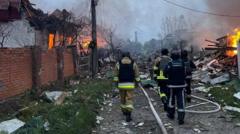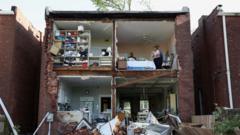Human rights organizations Human Rights Watch and FairSquare highlight a troubling rise in fatalities among migrant workers in Saudi Arabia, primarily due to preventable accidents during construction activities linked to the upcoming World Cup. As FIFA faces criticism for its oversight, calls intensify for genuine reforms and accountability.
Human Rights Groups Alarmed by Rising Death Toll of Migrant Workers Ahead of Saudi World Cup

Human Rights Groups Alarmed by Rising Death Toll of Migrant Workers Ahead of Saudi World Cup
Concerns mount over preventable deaths among migrant construction workers in Saudi Arabia as the nation prepares for the 2034 World Cup, sparking urgent calls for improved safety standards.
Human rights organizations are raising red flags about a troubling increase in the fatalities of migrant construction workers in Saudi Arabia, especially as the country gears up to host the World Cup in 2034. Reports published by groups such as Human Rights Watch and FairSquare reveal that many worker deaths, attributed to preventable workplace accidents, are often misclassified as natural causes, leading to a lack of compensation for grieving families.
The World Cup, slated to be the most expansive and costly in history, is expected to see millions of migrant workers constructing extensive infrastructure, including 11 new stadiums, an entirely new rail and transit network, and hundreds of thousands of hotel rooms. Minky Worden, director of Global Initiatives at Human Rights Watch, warned that while preparations for the tournament are underway, they may come at an excessive human cost.
The concerns from rights groups come on the heels of a recent visit by FIFA President Gianni Infantino and former President Donald Trump to the nation for a U.S.-Saudi investment forum. FIFA has stated its commitment to upholding and promoting human rights within its operations, but critics argue it has failed to apply lessons learned from the preceding World Cup in Qatar, where migrant worker deaths were a significant issue.
Collecting comprehensive data on migrant worker fatalities in Saudi Arabia is exceedingly difficult, given the limited access afforded to human rights organizations and the ban on labor unions. Nonetheless, Human Rights Watch interviewed families of 31 workers from countries including Bangladesh, India, and Nepal, revealing grisly details of workers' deaths by falls, crushing incidents, electrocution, and exposure to extreme heat—issues compounded by construction work ramping up in preparation for the World Cup.
In a tragic instance, the first reported death related to World Cup construction was a Pakistani foreman, Muhammad Arshad, who fell from a site in March. While the Saudi government has claimed advancements in occupational health and safety, the global construction workers' union BWI has noted an alarming increase in preventable accidents, attributing these to systemic negligence and insufficient oversight.
Human Rights Watch and FairSquare also point out that Saudi medical authorities rarely conduct autopsies to determine the true cause of migrant workers' deaths, raising further concerns regarding the state of worker safety. FairSquare co-director James Lynch expressed severe doubts about the Saudi government's commitment to reform, highlighting a labor system that risks workers' lives and a medical system that fails to analyze deaths accurately.
In response to these accusations, FIFA has announced intentions to establish a welfare system for workers engaged in World Cup-related construction, aiming to create an environment of mandatory standards and enforcement in Saudi Arabia. The organization asserts that these initiatives could redefine worker protection in the country and facilitate broader labor reforms.
However, Human Rights Watch has criticized the lack of details outlining how this welfare system will function, urging that all migrant worker deaths be thoroughly investigated and that families receive dignified treatment and timely compensation. The BBC has sought comments from Saudi authorities regarding these pressing issues.





















